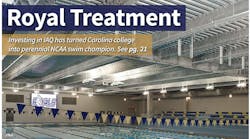The National Ground Water Association (NGWA) has developed a list of questions intended to help mechanical engineers, architects, developers, HVAC contractors, and others involved in geothermal-heat-pump installations evaluate the qualifications of drilling contractors:
Licenses, Certifications, Accreditations
Is the loop-well-drilling firm appropriately licensed to work within the state where your job is being done?
Does only the firm require a license, or will the drilling-rig operator also require a license?
Ask for copies of all certifications, licenses, and training documentation the contractor has for geothermal-heat-pump work. Keep this information on file with insurance forms and other relevant documents.
Does the drilling contractor or the driller working for the drilling contractor have meaningful credentials from a relevant third party, such as the NGWA or the International Ground Source Heat Pump Association (IGSHPA)?
As a means of protecting the public, 48 states have instituted statewide programs to license individuals installing water wells. In many states, these regulations also apply to geothermal-heat-pump wells. Although requirements for these programs vary from state to state, generally, some combination of testing, years of experience, and other criteria are used to measure competence and knowledge regarding well-construction techniques. These laws also provide states with an enforcement tool to ensure compliance with applicable construction codes.
The NGWA Certified Vertical Closed Loop Driller designation reflects an individual who has passed a written examination administered by the NGWA evaluating the individual's knowledge of the skills and competencies associated with constructing a loop well.
The IGSHPA offers accreditation for geothermal drillers following completion of an IGSHPA-sanctioned training program and successful scoring on an exam.
Skills and Competencies of the Contracting Firm
How many loop wells has the drilling firm drilled?
Ask about the number of holes drilled and the holes' depth. Also, ask for profiles of previous geothermal projects, as well as a list of reference contacts.
When was the last time the lead personnel from the drilling firm attended a formal program of continuing education related to their roles in a quality geothermal-heat-pump installation?
Ask for evidence, including the provider's name, the date, the location, etc.
In what drilling methods is the drilling contractor proficient? Can he or she produce an acceptable work history with a specific method?
Will the contractor's preferred method work in the formations expected?
Will the contractor's preferred method work with the site features?
For example, air drilling near a waterway may require enhanced site protection to contain drill spoils.
What diameter borehole does the drilling firm construct? Is the diameter specified so loop tubes, along with a grout tremie, fit appropriately in the borehole?
Too large of a diameter could increase a borehole's thermal resistance, reducing the borehole's ability to transmit energy.
Does the firm have experience drilling in the geology likely to be encountered at your job site?
What may seem like a bargain on drilling costs may be reflective of inexperience in the local geology and its drilling conditions. Consider the potential impacts of substituting less expensive drilling rates for experience and capability.
Does the drilling firm have qualifications and experience to design the loop field? Is the drilling firm being assigned this responsibility?
If the drilling firm says it has the ability to design the loop field, then it should provide evidence of its qualifications, including the use of appropriate system-design tools.
Does the drilling firm have the ability to test the thermal conductivity of the geologic setting of the proposed loop-well field?
If the firm does not have this ability, who will perform the testing?
Does the drilling firm have the proper equipment and trained workforce to complete the job?
The drilling firm should understand: (1) that a borehole is constructed to exact specifications, (2) how complications are handled, and (3) proper loop-well grouting and related procedures.
Does the firm have experience mixing, pumping, and placing by pressure-tremie method thermally enhanced bentonite grout?
Construction of a geothermal-heat-pump loop well includes, in continuous order: (1) drilling of a vertical borehole, (2) placement of a loop tube to the bottom of the vertical borehole with grout-tremie pipe, and (3) pressure grouting of the annulus space between the loop tube and the vertical borehole wall, from the bottom of the vertical borehole to the earth's surface. Loop emplacement and grouting should be performed in a timely manner to guarantee successful loop-tube placement, grout installation, and environmental protection.
Thermally enhanced grout has silica sand added to increase its thermal conductivity. It is more difficult to mix and pump than plain bentonite grout, so be certain a prospective drilling contractor has not only experience with these materials, but the equipment to put the materials properly in place.
How does the drilling firm control the diameter of boreholes?
How does the drilling firm control the plumbness of boreholes?
What are the drilling firm's procedures if a borehole is to be drilled in a formation different from that of a test-loop well?
How does the drilling firm prepare a borehole for the insertion of loop tubing?
What does the drilling firm do if a loop tube does not reach the bottom of a borehole?
How does the drilling firm grout to the bottom of a borehole with loop tubing in place?
How is grout tremie attached to loop tubing?
If an antifreeze agent is used, does the contractor know and understand the type, and is he or she aware of local and/or state regulations concerning what may be used?
Does the drilling contractor employ personnel with butt-and-socket-fusion training?
If the drilling contractor does not, an HVAC contractor may need to become qualified in this work or subcontract with someone who is.
Contract and Job-Site-Administration Issues
Who will be in charge of the loop-well-construction crew?
Who has final authority for the resolution of situations relating to the construction of the loop-well field that may arise?
Does the well-drilling firm have workers' compensation insurance (if required by state)?
Does the well-drilling firm have contractor's general-liability insurance for the job requirement?
Can the well-drilling firm furnish certified wage payroll for any federally financed or assisted construction contracts?
Who will get the appropriate permits required by the local and state government?
Does the drilling firm's response to your contract list the drilling and grouting equipment that will be used?
How does the drilling firm handle a borehole that cannot be completed to the required depth?
If a borehole has to be abandoned, is there a charge to the project or to you?
How does the firm decommission an abandoned borehole?
Do your contractor's specifications identify the type and amount of loop tubes and grouting materials and who is responsible for acquiring the adequate amounts to match the design of the loop field?
How will the drilling firm control, treat, and discharge the muddy groundwater produced during air rotary drilling in accordance with state and local erosion and sedimentation requirements?
If required, how will the drilling firm dispose of drilling mud if boreholes are drilled by the mud rotary method?
What is the drilling contractor's safety policy (not the insurance policy) for the job?
Does the drilling contractor have the appropriate material-safety data sheets for the job?
To find a drilling contractor, click here.
CHECK THIS OUT: In 2009, installation of the first campuswide geothermal system began at Ball State University in Muncie, Ind. When completed, it will be the largest geothermal-energy project in the United States, involving the heating and cooling of more than 40 buildings across 660 acres. At an estimated cost of $93 million, the system is expected to lower annual energy costs by $2 million and eliminate 80,000 tons of carbon emissions a year, cutting the campus's carbon footprint in half. Currently, the replacement of four coal-fired boilers, the drilling of 3,600 400-ft-deep boreholes, and the installation of heat-pump chillers are under way. In "Going Geothermal: Ball State University's Conversion to a Campuswide Geothermal System," to be presented during HPAC Engineering's Optimum Buildings Conference, part of HVACR Week, Jeff Urlaub, PE, and Michael Luster, PE, LEED AP, of MEP Associates, designer of the system, will discuss the complete transition of the central heating/cooling system to one utilizing geothermal fields and energy stations; the critical phases of analysis, planning, and design; and the potential for similar large-scale geothermal conversions. For more information, click here.








